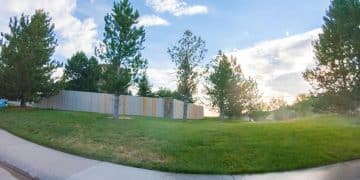Rent freeze programs for low-income households: a lifeline

Rent freeze programs are designed to prevent rent increases for low-income households, ensuring housing stability and allowing residents to invest in their community and well-being.
Rent freeze programs for low-income households can be a crucial support for families struggling to keep a roof over their heads. Have you ever wondered how these initiatives really work and who benefits from them? Let’s dive in!
Understanding rent freeze programs
Understanding rent freeze programs can be incredibly beneficial for those navigating the complexities of housing costs. These programs are designed to protect low-income households from sudden rent increases, ensuring stability in their living situations. They serve as a critical lifeline for families who might otherwise struggle to afford their homes. Let’s explore how these programs work and why they are essential.
How Rent Freeze Programs Work
Typically, rent freeze programs are enacted by local or state governments during economic hardships or crises. They limit the amount landlords can increase rents, helping to maintain affordability. Households are usually informed about the specific regulations that apply to their area.
Key Features of Rent Freeze Programs
- Temporarily halts rent increases for eligible tenants
- Applies to specific rental units based on regulations
- Provides eligibility criteria that may include income limits
In some regions, these programs also allow for certain exceptions, such as maintenance increases or tax-related adjustments. Understanding these nuances can help residents take advantage of the protections offered.
Eligibility Requirements
To qualify for a rent freeze program, applicants often need to demonstrate financial hardship. This may involve providing documentation of income and household size. Local housing authorities can assist potential applicants by outlining the requirements.
Many states encourage participation and provide easy avenues for applications, ensuring that families in need receive the help available. By keeping informed, households can successfully navigate these programs and enjoy the benefits that come with them. Living in an affordable home is a right that many strive to maintain, and rent freeze programs are crucial in achieving that goal. Understanding this system contributes to greater community awareness and ensures that beneficial programs remain in place for future generations.
Eligibility criteria for low-income households
 Eligibility criteria for low-income households can vary depending on local laws and the specifics of each rent freeze program. Understanding these requirements is essential for families looking for financial relief. Generally, these programs aim to assist those most in need, ensuring access to affordable housing.
Eligibility criteria for low-income households can vary depending on local laws and the specifics of each rent freeze program. Understanding these requirements is essential for families looking for financial relief. Generally, these programs aim to assist those most in need, ensuring access to affordable housing.
Common Eligibility Requirements
Most programs set boundaries on income levels that define low-income status. This typically includes:
- Maximum income limits based on family size
- Proof of financial hardship
- Current residency and tenancy documentation
These factors help determine whether a household qualifies for rent freeze benefits. Additionally, applicants may need to show proof of their current rent payments and other essential documents as part of the application process.
Income Limits Explained
Many programs use federal poverty guidelines to set income limits. These guidelines help ensure that assistance goes to families who truly need it. For example, a household might qualify if their annual income is below a certain threshold. Knowing these limits can help applicants understand their eligibility.
It’s important to check with local housing authorities about the specific criteria for each program. They can provide detailed information on income requirements and help applicants gather the necessary documentation. By staying informed, families can better navigate the process and access needed support. Rent freeze programs are designed to give families access to stability and security, which is critical particularly during economic hardships. With the right knowledge, low-income households can take advantage of these beneficial programs.
How to apply for rent freeze programs
Applying for rent freeze programs can seem daunting, but it’s a process designed to be accessible for families in need. Many local housing authorities provide clear steps to help applicants navigate this important resource. Knowing how to apply can make all the difference in accessing critical support.
Steps to Apply
The application process typically involves several key steps. First, gather essential documents, including:
- Proof of income
- Lease agreement
- Identification for all household members
Once you have these documents, reach out to your local housing authority for the specific application form. Filling out this form accurately is essential to ensure quick processing. After submission, be prepared to respond to any follow-up requests for additional information or documentation. Staying organized during this time can help streamline the process.
Online and In-Person Applications
Many housing authorities now offer online applications, making it more convenient for applicants. It’s important to visit the official website where you can find resources and instructions. If you prefer, applications can usually also be completed in person at local housing offices. Consider calling ahead to confirm hours and any requirements for in-person visits.
Throughout the application process, it can be beneficial to keep a record of your submitted documents and communications. This will help you track the status of your application and address any potential issues efficiently. Remember that timely applications are often prioritized, so it’s wise to apply as soon as you see a need for assistance. Rent freeze programs provide valuable help to families, allowing them to stabilize their housing costs and ensure security in their homes.
Impact of rent freeze on communities
 The impact of rent freeze programs on communities can be profound. These initiatives not only help individuals but also strengthen the overall stability of neighborhoods. When families are given relief from rising rents, they can focus on other needs such as education and healthcare.
The impact of rent freeze programs on communities can be profound. These initiatives not only help individuals but also strengthen the overall stability of neighborhoods. When families are given relief from rising rents, they can focus on other needs such as education and healthcare.
Community Benefits
One notable benefit is the retention of long-term residents. When people can afford their homes, local schools benefit from increased enrollment, contributing to more stable funding and resources. Communities become tighter knit as families stay in place, participating in local activities and fostering relationships.
Economic Stability
Moreover, rent freeze programs can aid local economies. When households spend less on housing, they have more disposable income for local businesses. This stimulates growth in the area, helping shops and services thrive. The ripple effect can lead to job creation, which further lifts community spirits.
Additionally, these programs can reduce the risk of homelessness. By providing financial relief, families are less likely to face eviction, which often results in significant social costs for communities. It helps maintain a diverse population, where various social strata can interact and contribute to the local economy.
Moreover, the sense of security that comes with stable housing leads to improved mental health for residents. Knowing they can afford their homes allows families to invest in their futures rather than simply surviving day to day. So, the impact of rent freeze programs extends well beyond individual families, shaping the very fabric of communities and solidifying their foundations.
In conclusion, rent freeze programs play a vital role in supporting low-income households and strengthening communities. These initiatives help families maintain their homes, reduce economic stress, and enhance local stability. By providing relief from rising rents, these programs allow residents to focus on their well-being and contribute positively to their neighborhoods. Understanding the application process and eligibility criteria can empower families to take advantage of these programs. The impact of rent freeze programs extends beyond individuals, enriching the community as a whole and fostering a sense of belonging for everyone.
FAQ – Frequently Asked Questions about Rent Freeze Programs
What are rent freeze programs?
Rent freeze programs are initiatives designed to prevent landlords from increasing rents for eligible low-income households, ensuring housing stability.
Who is eligible for rent freeze programs?
Eligibility typically depends on income level, family size, and specific local regulations that outline the criteria for participation.
How do I apply for a rent freeze program?
To apply, gather required documents such as proof of income and a lease agreement, then submit an application through your local housing authority.
What are the benefits of rent freeze programs for communities?
These programs help maintain affordable housing, strengthen community bonds, and promote economic stability by allowing families to stay in their homes.





